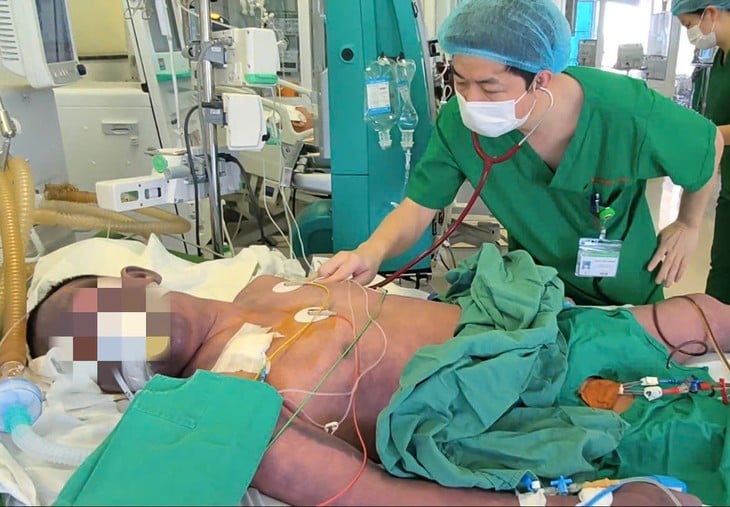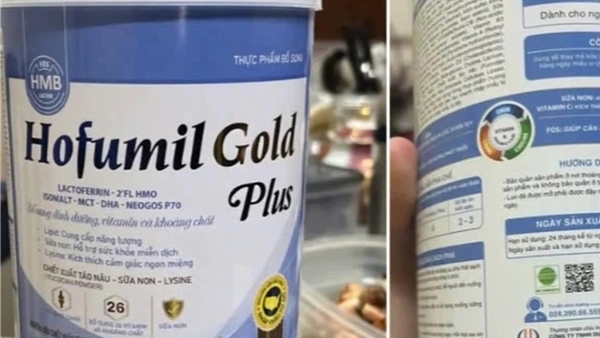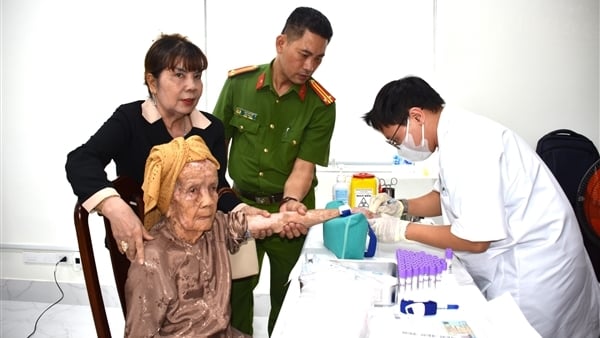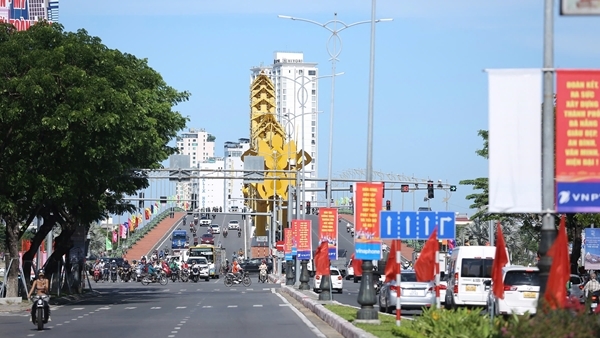On the afternoon of April 14, the Central Hospital for Tropical Diseases announced that male patient TVL (49 years old, from Thai Binh) was admitted to the hospital with a state of hemorrhagic necrosis on the face that quickly spread throughout the body. The initial cause was determined to be related to Mr. L buying pig intestines to eat at home about a week before.
According to the patient's family, Mr. L ate the pig's intestines alone. A week later (early morning of April 13), he suddenly had a high fever of 40 degrees Celsius, chills, severe abdominal pain, frequent loose stools, fatigue, body aches, and a sharp drop in blood pressure. He was taken to the local hospital in critical condition, had to be intubated, had to maintain vasomotor function, and then urgently transferred to the Intensive Care Center, Central Hospital for Tropical Diseases.
There, he was diagnosed with Streptococcus suis – a dangerous bacteria that can be transmitted from pigs to humans through undercooked food or through open wounds.
A critically ill patient with streptococcus suis infection is being treated at the Central Hospital for Tropical Diseases.
According to MSc. Dr. Dong Phu Khiem, Deputy Director of the Intensive Care Center, Central Hospital for Tropical Diseases, the patient was admitted in a state of septic shock and immediately received intensive treatment with antibiotics, fluid resuscitation, mechanical ventilation, blood filtration and transfusion of necessary blood products. However, the patient's condition is still very serious, with a poor prognosis and a high risk of death.
According to Dr. Khiem, there is currently no vaccine to prevent Streptococcus suis. If not detected and treated promptly, the disease can leave serious sequelae such as deafness, nerve damage or multiple organ failure. Therefore, early diagnosis and timely treatment are key factors in improving treatment effectiveness and reducing mortality rates due to Streptococcus suis infection in humans.
As a precaution, Dr. Khiem recommends that people absolutely do not eat blood pudding, pig intestines or any other pork products that have not been thoroughly cooked. When buying meat, choose products with clear origins, avoid meat with unusual color, signs of edema or bleeding.
People involved in slaughtering and processing pork must wear gloves, masks and clean their hands after contact. If there are open wounds on the hands or feet, they must be covered with waterproof gauze before handling raw food.
In addition, with ready-to-eat food bought outside, people should blanch it in boiling water or cook it thoroughly before eating to ensure food hygiene and safety.
Source: https://cand.com.vn/doi-song/nguoi-dan-ong-nguy-kich-sau-1-tuan-an-long-lon-i765096/



![[Photo] Closing of the 4th Summit of the Partnership for Green Growth and the Global Goals](https://vstatic.vietnam.vn/vietnam/resource/IMAGE/2025/4/17/c0a0df9852c84e58be0a8b939189c85a)

![[Photo] Nhan Dan Newspaper announces the project "Love Vietnam so much"](https://vstatic.vietnam.vn/vietnam/resource/IMAGE/2025/4/17/362f882012d3432783fc92fab1b3e980)
![[Photo] General Secretary To Lam receives French Ambassador to Vietnam Olivier Brochet](https://vstatic.vietnam.vn/vietnam/resource/IMAGE/2025/4/17/49224f0f12e84b66a73b17eb251f7278)
![[Photo] Promoting friendship, solidarity and cooperation between the armies and people of the two countries](https://vstatic.vietnam.vn/vietnam/resource/IMAGE/2025/4/17/0c4d087864f14092aed77252590b6bae)
![[Photo] National Assembly Chairman Tran Thanh Man meets with outstanding workers in the oil and gas industry](https://vstatic.vietnam.vn/vietnam/resource/IMAGE/2025/4/17/1d0de4026b75434ab34279624db7ee4a)














![[Photo] Welcoming ceremony for Chinese Defense Minister and delegation for friendship exchange](https://vstatic.vietnam.vn/vietnam/resource/IMAGE/2025/4/17/fadd533046594e5cacbb28de4c4d5655)




























![[Video] Viettel officially puts into operation the largest submarine optical cable line in Vietnam](https://vstatic.vietnam.vn/vietnam/resource/IMAGE/2025/4/17/f19008c6010c4a538cc422cb791ca0a1)







































Comment (0)